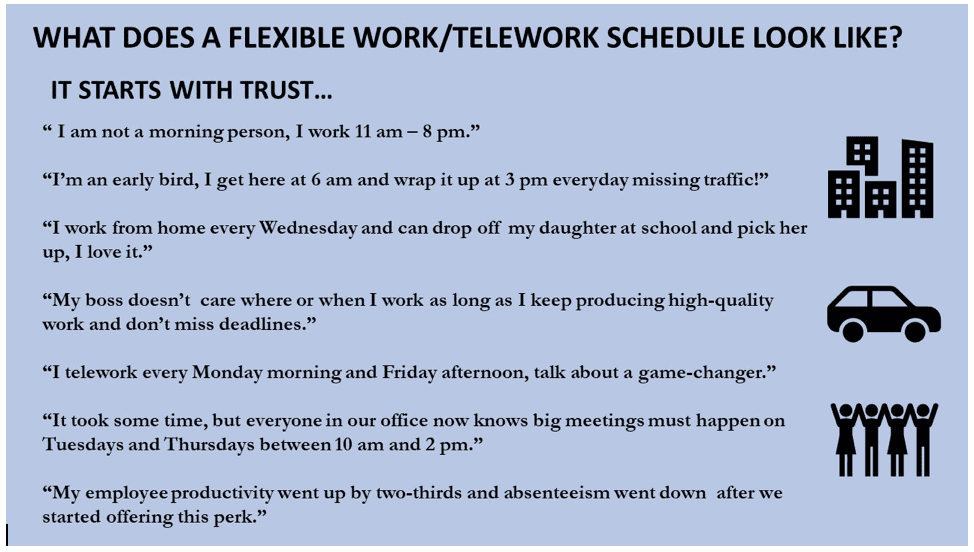Employers should consider Flexible Work Schedules and Teleworking as Retention and Recruitment Tools
The Denver South region is an economic engine bursting with talented professionals working in impressive industries including aviation, aerospace, broadcasting, engineering, financial services, healthcare, IT and telecommunications just to mention a few. Geographically recognized as the area between I-225 south through Lone Tree, Denver South is home to more than 150,000 jobs with another 250,000 in the broader economic region comprising eight zip codes. Recent studies project yet another 74,000 jobs in the Denver South corridor in the next 15 years.
However, with jobs come people and with people, traffic.
Denver South is known as an affluent, highly educated and eclectic corridor. Yet it’s also known to feature drivers who love their cars and who love to be in them alone. As a result, this region also features a 90 percent drive-alone rate.
Combine that reality with the fact that the RTD transit system and CDOT I-25 corridor are essentially built out with limited options for additional lanes or light rail tracks, and our thriving region faces a formidable challenge.
While the Denver South Transportation Management Association (DSTMA) continues to work on first/last mile solutions and strategies to move people, goods and services more efficiently in this region, that alone simply won’t be enough. Mitigating congestion through proven Transportation Demand Management (TDM) strategies will also be key. According to TransitScreen, 23 percent of workers have left a job due to a bad commute and 60 percent of employees surveyed feel their companies don’t do enough to help with their commute.
Denver South employees are hungry for flexibility beyond the traditional 9-to-5 model. The 2019 DSTMA Commuter Survey results indicate 93 percent of the 1,000 people surveyed feel a flexible work schedule is one of the most valuable benefits their employers could offer. So let’s dive in to what can be achieved using flexible schedules and telecommuting options.
First and foremost, flexibility should be fostered from a position of trust by both the employee and the employer. If you are an employee advocating for this valuable perk, can you be trusted? Don’t be the one binge-watching Netflix on your laptop that ruins it for everyone else. And as the employer considering implementing flexible work, can you trust your employees? Results from other companies who have tried it might surprise you.
Suggested Reading:
Second, flexible schedules and telework should relate to a clear company policy. Due to better technology and enhanced connectivity, employers now have the ability to be flexible. Some have staggered start and end times with employees all in the office on certain dedicated days. Other organizations allow their employees to be empowered to pick one or more days a week to work from home. Others don’t necessarily care where or when their employees work, as long as the work gets done and quality isn’t compromised.
One example of a company employing these strategies right here in Denver South is AECOM, with 800 employees, which allows teleworking and flexible work schedules for their organization. Their policy states: “AECOM allows their employees to work remotely for all or part of their regular work week and to adjust the times and/ or days of their regular full-time work shift or work schedule, as long as the schedule meets the required core hour period and the needs of their specific job requirements.” Their policy also indicates work arrangements must be documented and approved by management and can be discontinued at AECOM’s sole discretion.
Lastly, consider the potential impact to the bottom line. Recent reports show companies that offer flexible work options have increased productivity, less stressed workers, decreased absenteeism, and extra cash in both the employers’ and employees’ pockets, resulting in less travel and overhead costs in addition to happier employees.
These proven low- and no-cost TDM strategies work for retaining, recruiting and motivating people to focus on the work, beyond just planting an “asset” in an organization for 8 hours a day.
Interested in starting a flexible and or telework program at your company? We can help. Contact the Denver South TMA today!


